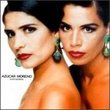| All Artists: Patty Waters Title: Love Songs Members Wishing: 1 Total Copies: 0 Label: Jazz Focus Original Release Date: 10/14/1997 Re-Release Date: 6/15/1996 Genres: Jazz, Pop Style: Avant Garde & Free Jazz Number of Discs: 1 SwapaCD Credits: 1 UPCs: 078686801228, 007868680122 |
Search - Patty Waters :: Love Songs
 | Patty Waters Love Songs Genres: Jazz, Pop
Patty Waters may be best known for her two critically acclaimed recordings for the ESP-Disk' label, but what is less well-known is that she also recorded a magnificent CD for Jazz Focus. There is no better gift for that sp... more » |
Larger Image |
CD DetailsSynopsis
Album Description Patty Waters may be best known for her two critically acclaimed recordings for the ESP-Disk' label, but what is less well-known is that she also recorded a magnificent CD for Jazz Focus. There is no better gift for that special someone who likes listening to romantic ballads, superbly sung. Similar CDs
|
CD ReviewsBrilliant, unexpected new work from the innovative legend Gregor von Kallahann | 04/05/1999 (5 out of 5 stars) "Out of the blue comes this exquisite work from the artist who hasn't recorded in 30 years. I read elsewhere that each song was recorded one take, no rehearsal. Two takes, completely different, are included of "Don't Explain". Waters is backed by the much-recorded and praised pianist Jessica Williams. These sessions show Williams' strengths as well as her weaknesses.Waters is surely the most important talent she has ever recorded with, and Williams occasionally seems out of her depth ; as in her weak approach to a Billie Holiday blues. Waters, infamous for her strong, shouting,occasionally yowling free style recordings for ESP in the mid sixties, here is investigating the use of her "small voice" ; an almost "spoken" approach to a book of standards..most associated with "Lady Day". The result is a completely "true" sound of a singing voice..no "show-business"..the voice as instrument..a purveyor of the lyrics; some of which, though common("Summertime"), you hear as though the first time. Patty Waters, a one time Downbeat Poll winner, a favorite of musicians from Miles Davis to Patti Smith to Thurston Moore, is definitely back! The Montery Jazz Festival1999 has just announced her appearance for 2 one hour concerts. Hooray!!!" What Becomes A Legend Most? Gregor von Kallahann | 02/07/2004 (4 out of 5 stars) "Patty Waters' first record (1965's PATTY WATERS SINGS)consisted of a number of self-penned originals followed by her hair-raising, avant-garde take of the old folk song "Black Is the Color of My True Love's Hair." It is the latter track that contributed most to making her a legend of sorts among lovers of experimental music. The obvious irony was that side one of the original vinyl was close to standard vocal fare, Patty accompanying herself on piano on a number of spare ballad miniatures. Had she achieved a more mainstream kind of acceptance, it is very likely that some of those songs might have become standards in their own right. I can think of any number of singers who could do justice to Patty's own "Moon, Don't Come Up Tonight," for instance. But they'd have it hear it first.Patty's 1996 comeback CD, LOVE SONGS, is similar in tone to Side One of the original vinyl PATTY WATERS SINGS. Patty sings these classic songs in the same husky, breathy voice that she used on the earlier record. Her instrument has aged a bit, but on her more ballad-y numbers, she was always primarily focused on phrasing and interpretation anyway. And she approaches genius at that.If you think the world doesn't need another recording of "Someone to Watch Over Me" or "Don't Explain," well, ordinarily you'd have a point. But to listen to Patty Waters interpretations of these and other standards is to realize that an inventive singer can always breathe new life into these old cabaret chansons. I would have to agree with those who maintain that collaborator Jessica Williams piano arrangements are sometimes just right and other times way too intrusive. The album, by all appearances, is something of a low-budget effort, and perhaps not all the details were worked out as well as they might be. If judged by "live performance" criteria, however, (and it does appear to have been a "live in the studio" recording) it is quite good and singer and accompanist are, for the most part, in synch. And Williams must be credited for some fine synthesizer work on the last track "Mood Indigo." She successfully creates the illusion of a full band behind Waters' vocal. It's particularly welcome after an entire album of solo piano accompaniment, which good as it often is, can get a bit monotonous.Patty Waters does give a taste of the old avant-garderie on her version on "Nature Boy," but it's so understated that it only begins to hint at the experimentalism of old.I've often thought that Patty Waters'more straightforward material lent legitimacy to her more experimental projects. When you realize that she CAN sing, it's harder to be dismissive of her occasional chanting or screaming. It's sort of like being able to point out that Picasso knew perspective before he proceeded to junk it. Probably a full 50% of Patty Waters' recorded output would be stuff you could play for Mom. That doesn't mean she still won't run screaming from the room when "Black Is the Color..." comes on. But at least you will have tried."
|

 Track Listings (12) - Disc #1
Track Listings (12) - Disc #1
